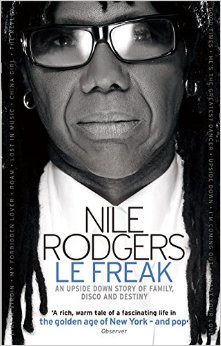 Le Freak: An Upside Down Story of Family, Disco, and Destiny
Le Freak: An Upside Down Story of Family, Disco, and Destiny
by Nile Rodgers
Spiegel & Grau, 318 pages, $27.00
IF YOU’RE READING this magazine, then you’ve probably danced to the music of Nile Rodgers at some point in your life, and probably more than once. A pioneer of the disco era and co-founder of the powerhouse R&B/dance group Chic, Rodgers created some of the most memorable club hits of the late 1970’s, including “Le Freak,” “Everybody Dance,” and “Good Times.” His roster of work as a writer and producer—for such artists as David Bowie, Madonna, Debbie Harry, Duran Duran, and the B-52’s—reads like a catalog of pop superstars. And while Rodgers is straight, he’s the songsmith behind two of the most famous gay anthems of all time: Diana Ross’ “I’m Coming Out” and Sister Sledge’s “We Are Family.”
Le Freak, Rodgers’ entertaining autobiography and pop-cultural tell-all book, chronicles his hardscrabble youth on the streets of New York, his lifelong struggle with drug addiction, and his ascent as a successful (yet still under-recognized) figure of 20th-century American music. The early chapters detail how Rodgers’ childhood left him feeling like an outcast who was bound for substance abuse problems. His beatnik parents were junkies and dealers themselves, and they remain colorful characters throughout the book. By his teenage years, the author wound up in the emergency room during a bad drug trip—and on the very same night that Andy Warhol was wheeled in after being shot by Valerie Solanas.
Rodgers’ luck turned around in 1970 when he met Bernard Edwards, his partner in Chic and a constant musical companion for nearly three decades. The pair became inseparable: “We were as close as two people could ever be. Our level of artistic trust was high. Every relationship that I’ve had with an artist is a slight variation of my relationship with Bernard.” Before they developed Chic’s signature style of tailored suits and clean-cut fashion, Rodgers remembers that his offbeat habits and intense dedication to his music even led his industry bosses to wonder if he might be gay.
Perhaps the most informative section of the memoir is Rodgers’ commentary on the deeper significance of the disco movement. He refers to it as a revolution of empowerment, “fueled by a desire for change to an unsustainable status quo.” Ethnic and sexual minorities had begun to migrate into the mainstream, and discothèques were a physical manifestation of that liberating cultural shift. As Rodgers perceptively reminisces, “A whole slew of touchy-feely dance moves were introduced into mainstream clubs—a consequence of gay sex coming out of the closet and onto the dance floor. People enjoyed intimate interaction with multiple partners, often with the same sex, while still maintaining the appearance of dancing.”
Rodgers wrote “I’m Coming Out” for Diana Ross shortly thereafter so as to celebrate the diva’s “status among gay men … in slightly coded language.” Although her self-titled 1980 album was a nightmare for Rodgers to produce from a business standpoint, it remains the best-selling album of her career, and the two struck up a friendship. In one hilarious anecdote, Rodgers recalls when the glamorous Miss Ross “feigned illness at a dinner party” and asked him to drive her home, only to have him secretly stop at a White Castle in Queens to pick up some cheap hamburgers. He also recalls a young Madonna’s occasional diva rants at studio crews while he was producing her 1984 breakthrough album Like a Virgin.
Rodgers’ downward spiral into addiction reached a breaking point in 1994, at which point he entered rehab; and he’s stayed clean and sober ever since. Near the end of the memoir, he mentions his recent treatment for an aggressive form of cancer, which he documented prolifically in riveting blog posts over the past couple of years. Rodgers has now overcome cancer, as well, and is back where he belongs: making music.
________________________________________________________
Jason Roush, author of After Hours, Breezeway, and Crosstown, teaches at Emerson College and New England Institute of Art.





